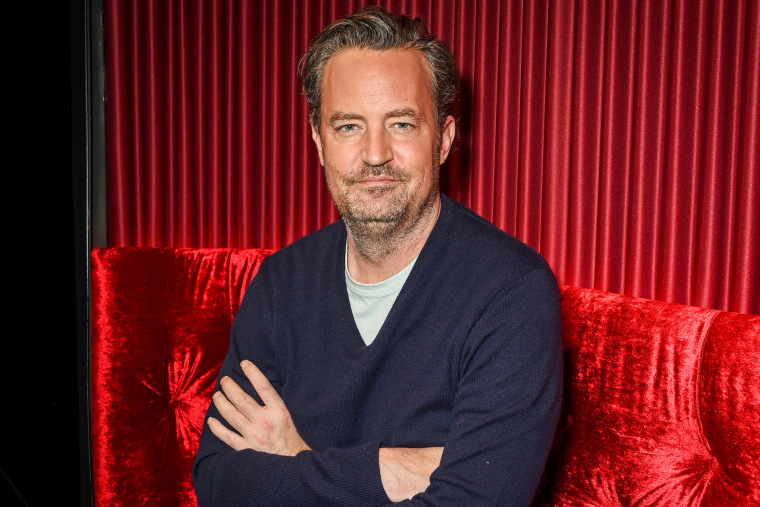It’s been a year since “Friends” star Matthew Perry was found unresponsive in the hot tub of his Los Angeles home. He died on Oct. 28, 2023, after an afternoon of playing pickleball and retreating to his house overlooking the Pacific Ocean.
His loved ones, who witnessed his drug and alcohol abuse for years, were heartbroken by what his mother later described as an unavoidable outcome.
“There was an inevitability to what was going to happen next to him,” Suzanne Perry told the “TODAY” show’s Savannah Guthrie.
His mother spoke about processing her grief and teared up when talking about how powerless one can feel against a loved one’s struggles with addiction.
“You’ve got to stop blaming yourself, because it tears you up,” she said.
Perry was best known for his role as one of the core cast members of the 1990s hit sitcom “Friends” on NBC. He played Chandler Bing, a statistical analyst whose sarcasm and one-liners quickly made him a favorite among Gen Xers.
The show was a blockbuster for 10 seasons, running from 1994 to 2004.
In 2022, Perry released his memoir “Friends, Lovers, and the Big Terrible Thing: A Memoir” and revealed details about his addiction. This included a near-death experience in 2019 after his colon burst as a result of opioid use. In total, he spent some $7 million on rehabilitation and recovery efforts, Perry wrote in the book.
Perry’s stepfather, “Dateline” correspondent Keith Morrison, said, “What he taught the world is that no amount of money will cure an addict.”
Two months after his death, the Los Angeles County medical examiner’s office said Perry died from the acute effects of ketamine. His death was ruled accidental. Other contributing factors included drowning, coronary artery disease and the effects of buprenorphine, which is used to treat opioid use disorder.

Long known as a club drug, ketamine is increasingly used to treat people with depression and other mental health issues but carries serious medical risks and can be fatal if abused. Perry had been undergoing ketamine infusion therapy to treat his depression and anxiety, but his final session took place more than a week before his death, according to the medical examiner’s office.
The levels of ketamine in his body were equivalent to the amount used for general anesthesia during surgery, the medical examiner said.
Federal prosecutors announced in August charges against five people in connection with Perry’s death. Two doctors, a live-in personal assistant, an acquaintance and a drug dealer known as the “ketamine queen” allegedly conspired to provide the actor with the ketamine that caused his death. (Three of those people, including a doctor who operated a ketamine clinic, have pleaded guilty. Another physician and the “ketamine queen” have pleaded not guilty.)
From September until Perry’s death in late October last year, the doctors provided him with about 20 vials of ketamine for $55,000 in cash, according to federal prosecutors.
“We didn’t know how much of it he was taking,” Keith Morrison said.
In the months leading up to his death, Perry appeared to have turned a corner with his addiction, relatives said. He reconnected with old friends, spoke openly about his spirituality and shared tender moments with family members he once avoided.
His younger sisters remember Perry constantly cracking jokes and making people laugh when they were young. “It was always a jubilant thing when he would come over,” his sister Caitlin Morrison recalled. “All he wanted was to love and to be loved,” Emily Morrison, another sister, added.
Now, loved ones switch tenses from past to present to past again as they remember the complicated man who brought them so much joy.
Caitlin Morrison helped spearhead the creation of the Matthew Perry Foundation and an in-patient facility. Its goal is to help overcome the stigma surrounding addiction disorders, promoting collaboration across communities and advocating for better treatment, according to the foundation’s website.
“Even when he was struggling in dark times, we were always proud of him,” Caitlin Morrison said. “We were always proud of the fact that he kept fighting and that he made it a big focus of his life to help other people.”
Part of its mission is to make it easier for families to discuss addiction and treat it more like a disease than a moral failing.
It’s a familiar story for the millions of people whose loved ones have addiction disorders, and it is a guiding principle for the foundation, the family said.
Suzanne Perry recalled how she and her son shared a fraught relationship throughout the years, but in the end, Matthew Perry softened and the two shared loving moments in his final months.
“I’m a very lucky woman,” Suzanne said, referring to Caitlin Morrison’s work with the foundation and the successes of her other children. “But there was one glitch, there was one problem, that I couldn’t conquer: I couldn’t help him.”
